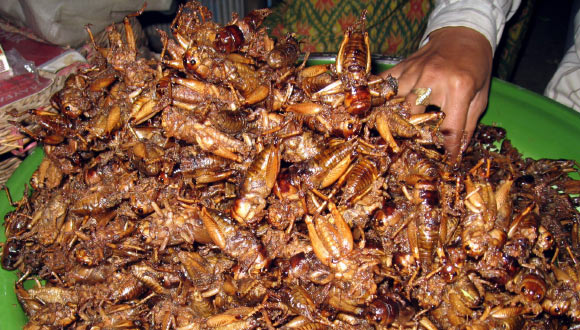A new study published in the journal Scientific Reports shows that consuming edible crickets can help support the growth of the probiotic bacterium Bifidobacterium animalis, a strain that has been linked to improved gastrointestinal function and other measures of health, and that eating crickets is not only safe in large amounts but may also reduce inflammation in the body.

Deep-fried crickets on sale in Cambodia. Image credit: Thomas Schoch / CC BY-SA 2.5.
More than 2 billion people around the world regularly consume insects, which are also a good source of protein, vitamins, minerals and healthy fats.
Colorado State University’s Professor Tiffany Weir and colleagues were interested in documenting for the first time via clinical trial the health effects of eating them.
“This study is important because insects represent a novel component in Western diets and their health effects in human populations haven’t really been studied,” Professor Weir said.
“With what we now know about the gut microbiota and its relationship to human health, it’s important to establish how a novel food might affect gut microbial populations. We found that cricket consumption may actually offer benefits beyond nutrition.”
“Raising insects for protein not only helps protect the environment, but also offers a more healthful option than meat in many wealthy countries with high-meat diets,” added study co-author Dr. Jonathan Patz, director of the Global Health Institute at the University of Wisconsin-Madison.
Crickets, like other insects, contain fibers, such as chitin, that are different from the dietary fiber found in foods like fruits and vegetables.
Fiber serves as a microbial food source and some fiber types promote the growth of beneficial bacteria, also known as probiotics.
The small trial probed whether insect fibers might influence the bacteria found in the gastrointestinal tract.
“We evaluated the effects of consuming 25 grams/day whole cricket powder on gut microbiota composition, while assessing safety and tolerability,” the study authors said.
“Twenty healthy adults participated in this six-week, double-blind, crossover dietary intervention.”
“They were randomized into two study arms and consumed either cricket-containing or control breakfast foods for 14 days, followed by a washout period and assignment to the opposite treatment.”
“Blood and stool samples were collected at baseline and after each treatment period to assess liver function and microbiota changes.”
Participants reported no significant gastrointestinal changes or side effects and the researchers found no evidence of changes to overall microbial composition or changes to gut inflammation.
They did see an increase in a metabolic enzyme associated with gut health, and a decrease in an inflammatory protein in the blood called TNF-alpha, which has been linked to other measures of well-being, like depression and cancer.
Additionally, they saw an increase in the abundance of beneficial gut bacteria like Bifidobacterium animalis.
“But more and larger studies are needed to replicate these findings and determine what components of crickets may contribute to improved gut health,” the scientists said.
“This very small study shows that this is something worth looking at in the future when promoting insects as a sustainable food source,” said study first author Valerie Stull, a recent doctoral graduate of the University of Wisconsin-Madison Nelson Institute for Environmental Studies.
_____
Valerie J. Stull et al. 2018. Impact of Edible Cricket Consumption on Gut Microbiota in Healthy Adults, a Double-blind, Randomized Crossover Trial. Scientific Reports 8, article number: 10762; doi: 10.1038/s41598-018-29032-2







